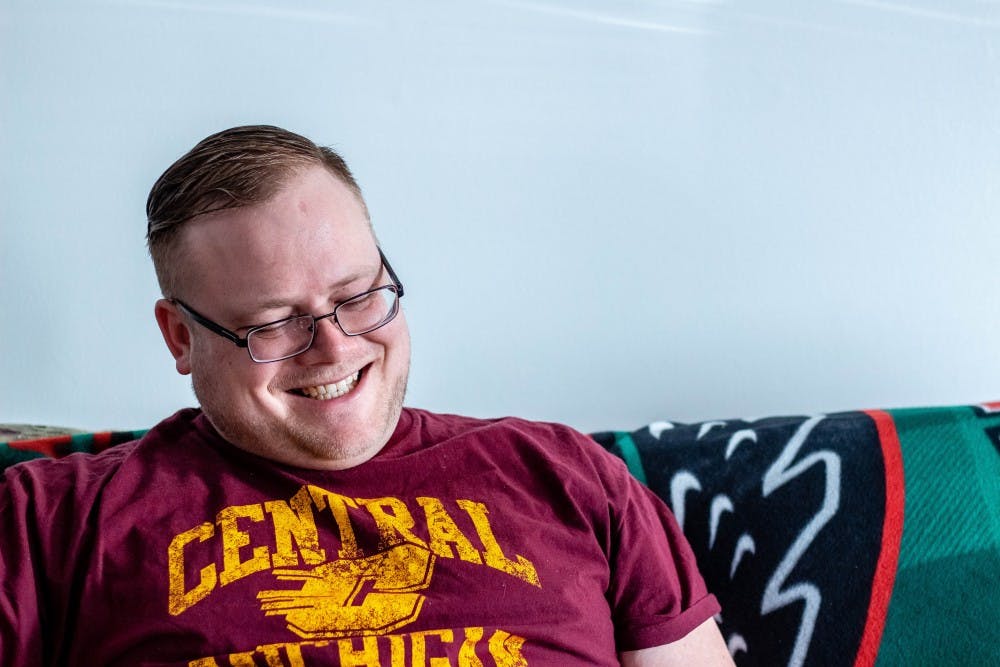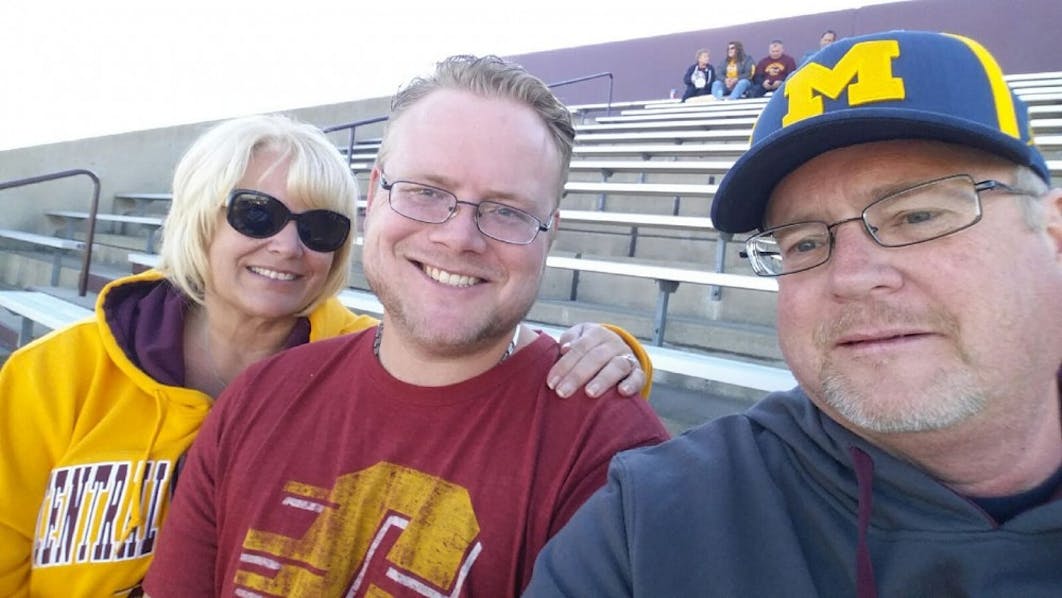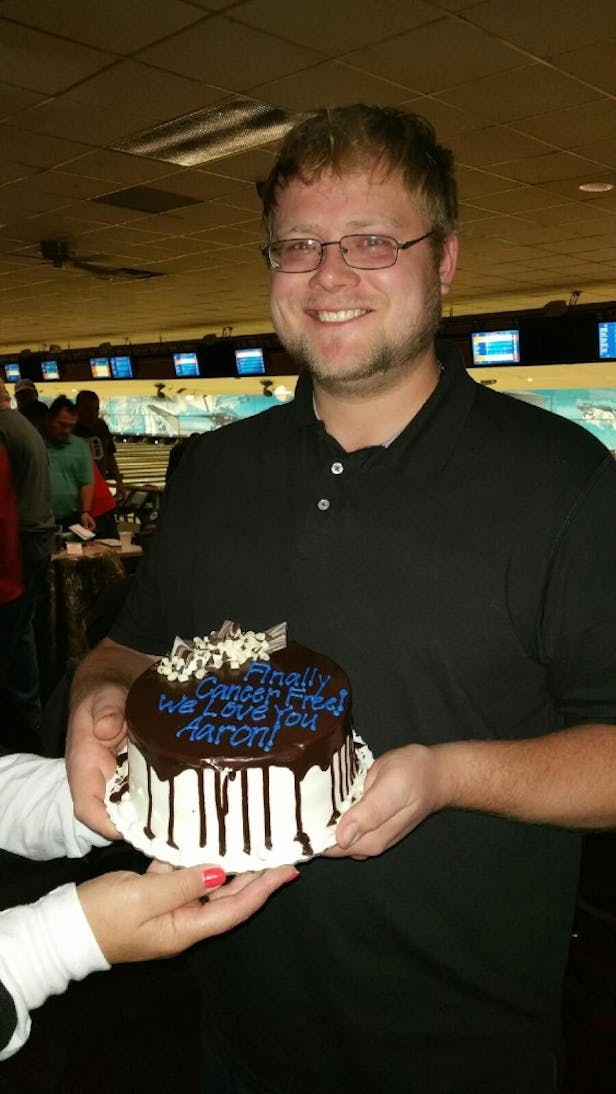Never too late: Muskegon senior finally arrives at CMU after beating cancer, serving in the Navy

Aaron Rop on his couch in his apartment on March 16 at Union Square Apartments. Rop is reflecting on his journey that led him to CMU.
Aaron Rop expected Navy boot camp to be difficult with the 6 a.m. wake-ups and grueling physical activity. Instead, the Muskegon senior struggled in different ways.
Rop was tired after running short distances. He had trouble waking up in the morning. He was constantly exhausted. Rop knew something was wrong with him.
“I was 22 years old and had been active my whole life,” he said. “Something odd was going on.”
About six weeks into boot camp, he noticed a lump on his neck. It was about half the size of a golf ball. With only a few weeks left of boot camp, he decided to tough it out. On his second day of vocational training, he finally went to see a physician assistant. A PET scan and blood test confirmed his diagnosis: Stage III Hodgkin Lymphoma.
“I was scared — wondering if they would be able to get rid of it,” Rop said.
Today, Rop is studying marketing at Central Michigan University. His father, Ron, graduated from CMU in the 1980s, and Aaron wanted to follow in his footsteps. Rop, who turns 30 on March 20, has overcome several obstacles, including being treated for cancer, on his journey to becoming a Chippewa.
Joining the Navy
In 2011, his younger brother, Andrew, decided to enlist in the Navy. Since he was 3 years old, Andrew wanted to be a police officer and he thought the military would give him a chance to decide if that’s what he wanted to do. The day Andrew went to the Navy recruiting office, Aaron decided to join him.
“It was a spontaneous decision,” Rop said. “I knew hardly anything about the military. I thought, ‘Get me out of Muskegon. I want to do something different with my life.’”
The Rop brothers were excited about joining the military, but their parents were apprehensive. Their dad met them at the recruitment center with tears in his eyes.
“I pictured my three boys going to college, two-year, four-year or vocational school and off they go,” their father said. “We hate it when our kids are far away, but the thought of when these two would come home, or if they would come home, really knocked me for a loop.”
When their mother, Kristi, saw enlistment papers, she cried.

“I told them they had to do two years of college before even talking about joining the military. (When) it had been two years for both of them, I hoped they forgot about it,” she said. “I was proud of them, but terrified at the same time.”
Rop left for basic training in April 2011. He knew boot camp would be difficult. He expected the long hours and little sleep, but he didn’t anticipate the exhaustion he experienced.
“In boot camp I really struggled,” he said. “I was really low on energy. I was trying to take a nap one day, and one of my instructors started yelling at me to get out of bed.”
After graduating from basic training in June, Rop went to Fort Lee, Virginia for culinary training. On the second day of training, he went to see a physician assistant about the lump on his neck, which had grown by then. He said the hysician assistant knew almost instantly that it was cancer.
According to the American Cancer Society, Hodgkin Lymphoma is spread through the lymph system, which is part of the immune system. The lymph system makes a special type of white blood cell used to fight germs in the body. Hodgkin Lymphoma is found most commonly in people ages 15-39 and older than 75, according to the Center for Disease Control and Prevention. About 91 percent of adults survive at least one year with Hodgkin Lymphoma and 80 percent survive for 10 years or more.
Survivors of Hodgkin Lymphoma have a high risk of developing a second cancer later in life, as a result of chemotherapy and radiation treatments. According to the US National Library of Medicine, adults in the U.S. have a 17 percent chance of developing non-Hodgkin lymphoma and a 23 percent chance of developing leukemia.
A few days after his initial vist, Rop traveled to the Naval Hospital in Portsmouth, Virginia for a PET scan, which confirmed that he had Stage III Hodgkin Lymphoma. The cancer was in his neck, chest and spleen.
“It took a few days to (comprehend) that I am 22 years old and I have cancer,” Rop said. “I wasn’t scared at the time. I just wanted to know what we were going to do to defeat this.”
After the appointment with the oncologist, Rop called his dad to deliver the diagnosis. His dad was at work when his received that call. When his son told him about the test results, Ron said he didn’t feel anything, he was just numb.
“We knew about the lump on his neck,” Ron said. “We thought it was just an enlarged lymph node — no big deal.”
Kristi said she was having a “mom moment” sitting in Aaron’s room when she found out. Her phone rang. It was the oncologist.
“Your son has Stage III Hodgkin Lymphoma,” the doctor said. “How soon can you get down here?”
She simply said “OK,” and hung up the phone.
After she processed what the doctor said on the phone, she said she cried for hours. The family had the option of bringing Rop back to Michigan for treatment or having him stay in Virginia.
“Aaron was in the best place he could be at the time,” his mother said. “I didn’t want to bring him home. I trusted where he was.”
Andrew was in boot camp when his brother started treatment. He received a letter from his parents explaining the diagnosis. He was frustrated that he couldn’t do anything at the time.
After finishing boot camp, Andrew had the option to be stationed in Greece, Italy or California. His choice was easy. He requested to be stationed in Norfolk, Virginia, just 20 minutes away from the Naval Medical Center in Portsmouth where his brother was receiving treatment.
Treatment
Rop’s treatment plan included six months of chemotherapy, followed by one year of medical hold until the doctors were confident that he was in remission. His chemotherapy began in July 2011, two weeks after receiving his cancer diagnosis.
His brother went with Rop to his chemotherapy treatments and visited on the weekends when he could. It was nice to have a family member there, Rop said, while he was going through such a difficult time. His brother remembers that going through treatment was extremely difficult for Rop. Once a high school athlete, he no longer had the energy to do any of the activities he enjoyed. He slept for 10-12 hours each night and napped in the afternoons. Even going outside was exhausting — the sun drained all of his energy.
Rop said he made friends at the hospital while he was going through treatment. Ernie Lozano was being treated for knee and shoulder injuries when he met Rop. He had completed his third tour with the Navy in Bahrain. Lozano said Rop had a lot of support at the hospital because the older men receiving treatment took him under their wing. They took care of Rop when his family couldn’t.
On top of being tired most of the time, Rop said during his time in treatment he was also depressed, so he didn’t want to go out very often.
“(I felt like) I didn’t have anybody. I didn’t have a vehicle, all my friends were far away in Fort Lee,” he said. “I didn’t have the resources to live life to the fullest.”
Lozano and his friends liked to cheer up Rop by bringing him to sporting events and USO events in the area. They went to concerts, flea markets and antique stores.
On one particular trip, he and Lozano went deep-sea fishing off the coast of Virginia. Lozano caught and released a dolphin and Rop caught a sailfish. They spent the entire day out on the ocean and were treated to breakfast, lunch and dinner.
“That’s a day I will treasure for the rest of my life,” Lozano said.
Remission
It is tradition at the hospital to ring a bell in the hallway when a patient completes his or her treatment. Rop had watched as others rang the bell. He couldn’t wait until it was his turn. After he finished chemotherapy in December 2011 – it was finally Rop’s turn to ring that bell.
“It was amazing,” he said. “I beat (cancer)… and I could finally move on.”
The treatment appeared to have stopped the growth of cancer in his body, but his doctor was hesitant about declaring him in remission at first. Rop said there was a scare after he finished treatment. A PET scan showed something in his chest, which the doctor thought could have been another growth. The plan was to send him to North Carolina for radiation, but after further testing, it turned out to be residual cells from the chemotherapy.
He said he often worries about the possibility of developing cancer again.
“It’s a scary thought,” Rop said. “I don’t know if my body could take another round of chemo – or perhaps radiation – in the future.”

Courtesy Photo | Aaron Rop
Aaron Rop and his family celebrate five years of remission on Oct. 30, 2017.
In October 2012, Rop’s doctors determined his cancer was in remission. Five years later, on Oct. 30, 2017, he was declared cancer-free. Although he survived cancer, he is still dealing with the effects of chemotherapy. He has constant back pain, numbness in his arms and suffers from short-term memory loss.
“The tragedy of the whole thing is that yes, you are a cancer survivor,” his mother said. “But saying you’re a survivor means you’re alive. Yes, you’re alive and that’s wonderful, but you still have a lot to overcome.”
That didn’t hold him back from his dream, though. Rop still wanted to go to CMU. He just wasn’t sure how to get there.
Coming to CMU
After he received his associate’s degree from Muskegon Community College in 2014, Rop was medically discharged from the Navy in March 2016, after serving three and a half years in the Navy reserves.
In 2017, he called the CMU admissions office and asked what he needed to do to be accepted. When he began at MCC at age 18, he wasn’t focused on classes and earned a 2.46 GPA. Admissions told him if he took some more classes and got a better GPA, he would get in.
In Spring 2018, he took four business classes at MCC and worked harder than he ever had before. It was more difficult going to college this time because he had problems with his memory. Despite that challenge, he finished the semester with the highest GPA he had ever received: 3.92.
Rop was visiting his brother in Maryland when he found out he was going to be a Chippewa. He called the admissions office to ask about the status of his application. When they said he had been accepted for the Fall semester, he began to cry.
“I was overwhelmed with joy,” he said. “Ever since I was a senior in high school, I knew I wanted to go to CMU. It’s very special to be here.”
Rop said he loves the classes he is taking and takes advantage of the opportunities CMU provides to students, like concerts and speeches. He attended all but one football game in the fall, and also goes to basketball games. He is also a part of an intramural bowling team, the Sparing Strikes. He will graduate with his bachelor’s degree in December 2021 with a major in marketing and a minor in hospitality.
“Over the years, I always thought in the back of my mind that I wanted to go to CMU,” Rop said. “So it’s very special to be here today.”






